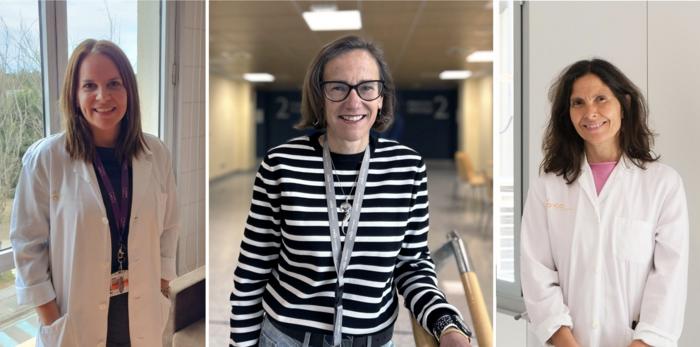In a groundbreaking clinical investigation, researchers have unveiled promising new applications for denosumab, a drug traditionally prescribed to prevent osteoporosis-related bone complications, now showing potential as an immune system modulator in early-stage breast cancer. This revelation emerges from the D-BIOMARK clinical trial, which emphasizes the fusion of molecular oncology insights and clinical experimentation, marking a significant advancement in the ongoing quest to enhance therapeutic strategies against breast cancer.
Denosumab operates by targeting and inhibiting the receptor activator of nuclear factor kappa-B (RANK) pathway, a crucial molecular signaling cascade deeply implicated in bone metabolism and mammary gland development. The RANK pathway, mediated primarily through the interplay of RANK and its ligand RANKL, is recognized for its involvement in normal physiological processes such as bone remodeling and progesterone-driven mammary tissue maturation. However, dysregulation in this pathway contributes extensively to oncogenic processes, facilitating tumor proliferation and metastasis within breast tissue.
The impetus for repurposing denosumab in oncology stems from its well-established safety profile and extensive clinical usage in managing skeletal-related events in metastatic cancers. By leveraging an existing pharmacological agent with a known risk-benefit ratio, scientists aim to accelerate the translation of molecular discoveries into tangible clinical benefits, thereby circumventing the prolonged timelines typically associated with new drug development.
The crux of the D-BIOMARK trial involved administering denosumab to sixty women diagnosed with HER2-negative early breast cancer, a subtype representing a substantial patient demographic with limited options for immunotherapy responsiveness. Contrary to expectations centered on direct cytostatic effects, the trial data revealed that denosumab did not significantly diminish tumoral cell proliferation rates. Instead, the drug exhibited a profound capacity to enhance the recruitment and infiltration of immune cells into the tumor microenvironment. These immune cells, encompassing various lymphocyte populations, are pivotal components of the body’s endogenous anti-tumor defense machinery.
This immune activation is particularly noteworthy in luminal B breast cancers, a hormonally driven subtype characterized by intermediate to high proliferative indices and commonly exhibiting resistance to existing immunotherapeutic modalities. The heightened presence of tumor-infiltrating lymphocytes (TILs) correlates strongly with better prognostic outcomes and improved responsiveness to immunotherapy across multiple malignancies. Therefore, augmenting immune infiltration using denosumab could potentiate the efficacy of current immune checkpoint inhibitors and open avenues for novel combination therapies.
Mechanistically, the inhibition of the RANK pathway may relieve local immunosuppression within the tumor milieu by altering the cytokine network and cellular interactions that typically curb immune cell activation. This paradigm shift transforms denosumab from a mere bone-targeting agent into a immuno-oncological adjuvant, capable of reprogramming the tumor stroma dynamic toward an anti-tumor state.
The collaboration between basic scientists and clinical oncologists was critical in advancing this translational research. Years of preclinical studies elucidating the role of the RANK/RANKL axis in breast pathology laid the groundwork for the clinical evaluation of RANK inhibitors. These foundational studies demonstrated that RANK signaling contributes not only to hormone-driven mammary carcinogenesis but also to the establishment of an immunosuppressive tumor environment, providing a compelling rationale for the therapeutic targeting of this pathway.
Moreover, the trial underscored the importance of patient involvement in advancing cancer research. The willingness of patients to participate and contribute biological samples enabled comprehensive analysis that linked molecular pathway inhibition to immunological endpoints. This patient-centered approach exemplifies the ethical and scientific synergy necessary for accelerating progress in oncology.
From a clinical research perspective, the window-of-opportunity design of the D-BIOMARK trial allowed for the assessment of biological drug effects within a short preoperative timeframe, minimizing patient exposure while providing critical data on immunomodulatory mechanisms. Such innovative trial design enhances feasibility and accelerates data generation, which is essential in rapid therapeutic development.
Given the suboptimal response rates in immunotherapy for luminal B breast tumors, denosumab’s ability to modulate immune infiltration opens promising clinical avenues. Future research will focus on deciphering the precise molecular events orchestrated by RANK inhibition within tumor and immune cells, as well as exploring synergistic combinations of denosumab with checkpoint inhibitors or other immunotherapies to overcome intrinsic resistance mechanisms.
This study channels the convergence of molecular biology, pharmacology, and clinical oncology toward an integrated approach for treating breast cancer. It exemplifies the paradigm shift from targeting malignant cells directly to manipulating the tumor microenvironment and host immunity to achieve durable therapeutic responses.
In conclusion, denosumab’s repositioning as an immune modulator embodies the potential of repurposing established drugs in oncology, providing not only a novel therapeutic option but also deeper insights into the complex interplay between cancer cells and the immune system. As investigations continue, the hope is that these findings will translate into improved survival and quality of life for patients affected by breast cancer worldwide.
Subject of Research: People
Article Title: Denosumab as an immune modulator in HER2-negative early breast cancer: results of the window-of-opportunity D-BIOMARK clinical trial
News Publication Date: 12-May-2025
Web References:
Breast Cancer Research Article
CNIO News on RANK pathway
CNIO News on overcoming resistance
Image Credits: IDIBELL/CNIO/ICO
Keywords: Drug studies, Drug targets, Drug combinations, Clinical trials, Translational research, Breast cancer, Cancer immunotherapy




